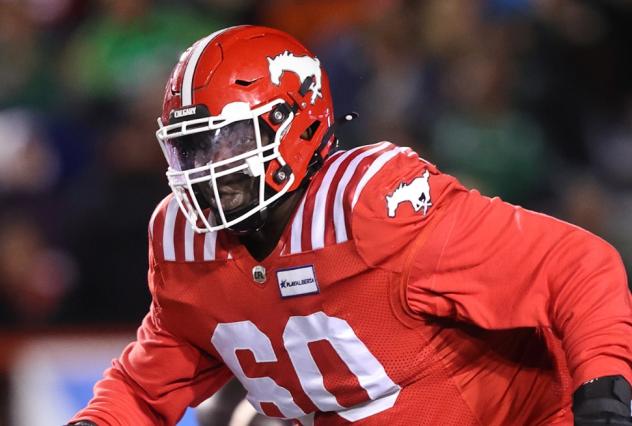Sports
Axes and armour: Athletes fight in medieval combat arena for sport in N.B. | CBC News
It’s midday on a recent Saturday in a quiet Sackville neighbourhood. You can hear the echoes of a small crowd chanting as heavy metal swords clash against armour.
Hidden behind the gate of one of the homes on this street are dozens of vehicles, an audience seated on stands —facing a patch of gravel surrounded by wood rails — and what looks to be two medieval knights.
Ryan Coombs had this combat stadium built in his backyard so that he and his team would have a place to train together and hold events.
Coombs is the captain of the Moncton Marauders, a medieval combat team, and they’re hosting a buhurt tournament called the Eastern War Tide, with fighters from Ontario, Quebec, Nova Scotia and even one from Maine here to test their steel and titanium against one another.
Buhurt is a brutal full-contact combat sport that seeks to replicate historical combat. The armour and weapons must be historically accurate, although the weapons must be blunted. Striking with those weapons is permitted in every battle but there is no stabbing allowed.
However dull the edge, Coombs said the bigger weapons can still do real damage, even through thick layers of armour.
In a tournament in February, he said his ribs were fractured by an axe.
“Those weapons hurt. They’re not sharp, but they have like a two millimetre edge on them and they will break your arm, they will hurt you if you allow yourself to get hit,” he said.
They wear chainmail and full-body armour while swinging heavy metal swords in battle. They’re playing a sport called buhurt — a type of medieval combat on display in Sackville, recently. CBC News spoke to athletes at that tournament to learn more about the sport and what motivates them to do it.
Coombs said a full set of armour can weigh up to 70 pounds, almost 32 kilograms, and can cost about $2,500, for a basic suit. A lot of the armour is handcrafted by European blacksmiths, he said.
“It’s the closest you’ll come to feeling what a real battle is. The first time you take a good strike in the face and you smell the O2 light up and you’re like … this is for real. People are slinging weapons trying to hurt me.”
But Coombs doesn’t fight just to win trophies or tournaments: he fights to fulfil a dream of being a knight.
“I think every little boy grows up with a stick in his hand dreaming of being a knight. I never thought it would be a reality until I saw this sport. And it’s legitimate and it’s real,” he said.
It’s also a sport that can appeal to anyone.
Geneviève Drouin fights for the buhurt teams Toronto Armoured Combat, the Scallagrims and the Crimson Tulips. She was at the recent Sackville tournament.
She calls the sport one of the hardest things she’s ever done in her life, but said the strong community is unlike any other.
“The brotherhood, the sisterhood in the community is just something I’ve never experienced anywhere else,” Drouin said.
Her focus has been on building her one-on-one combat career, which relies on a scoring system similar to boxing, where the number of strikes in a match are counted. But now she has bigger aspirations.

“We want to build the women’s division in Toronto and in Canada, in general. … I want to build a women’s team, a strong, internationally acclaimed women’s team,” Drouin said.
In this Sackville bout, Coombs said the fighters competed on their local teams, but they all have the opportunity to fight together on a national team called North Blood.
They hold tryouts for this team, ranking fighters based on skill level, participation in events, and even their willingness to learn, among other things.
“The goal is, I guess is to try to grow both — grow the local teams, get that culture going. More fighters on the local that’s going to allow us to do more nationally, travel overseas,” Coombs said.
And in the last few years, he says the Canadian team has competed in big tournaments in the U.S., coming fourth place at a North American tournament called Carolina Carnage.
This is also a sport with major attitude.
“If you’re not hitting me as hard as you can, you’re not treating me with respect,” said Land Pearson, the president of Medieval Combat Canada and a fighter for the Halifax Citadels at the Sackville event.

Pearson is well-known in the Canadian buhurt community for growing the sport to what it is today. Coombs describes him as the ‘granddaddy’ of the sport in Canada for his contributions in seeding clubs across the country.
Pearson said one of the main fighting formats in buhurt tournaments is a five-on-five group fight.
These are won by making members of the opposing team hit the ground. Once fighters fall, they must remain down for the rest of the fight and become part of the terrain.
However, he says these group fights can also get as big as 150-on-150, something he said he witnessed at the Battle of Nations, the buhurt world championship, typically held in Europe.
Pearson says teamwork is crucial during the group battles as your field of vision is limited with the armour on.
“A lot of times you can’t see a lot in those helmets so you are just really hoping that your buddy is there and he’s protecting you,” Pearson said.
Coombs said there’s a misconception sometimes when people hear about the sport and think they are re-enacting. He said that is not the case.
“It’s probably one of the roughest sports I’ve ever played.”
These tournaments, like the one in Sackville, aren’t for beginners. Coombs said practising how to work together and stay safe as a team is important before participating in competitive events.
“That’s emphasized. Like you wouldn’t put like somebody new out here … and expect they wouldn’t get injured because they probably would.
“You have to know how to protect yourself, how to work with your teammates to stay safe because, you see, anything goes.”










